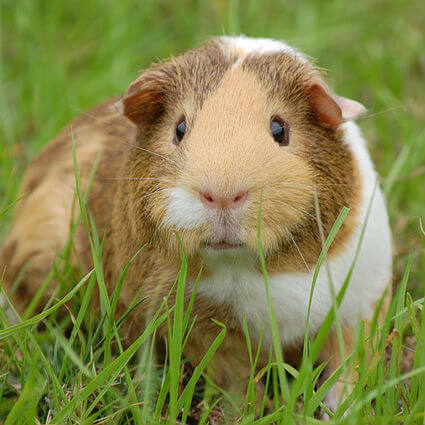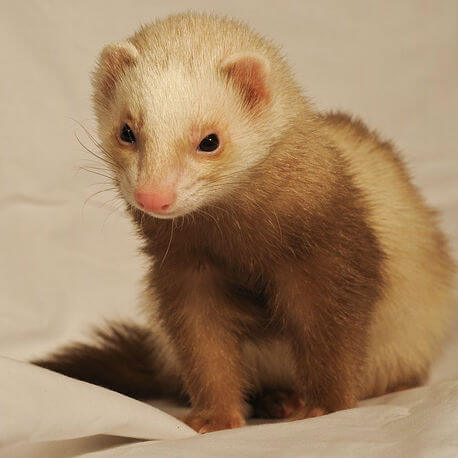Pocket Pets
Pocket pets such as rabbits, guinea pigs, ferrets, rats and mice are becoming much more popular as furry family members. They make ideal pets for people in smaller dwellings, or those without a yard. But despite their smaller size, they require just as much care and responsibility as their larger-sized animal friends. Most little pets are prey animals and therefore hide illnesses until they are quiet unwell, it is very important to bring your pet in for a check up as quickly as possible after any signs of ill health. At home it is also important to monitor their food intake, body condition, eyes, ears, mouth, feet and toileting behaviour.
Rabbits
Rabbits can make loving little pets. They are often kept as indoor companions, as they can easily be litter trained.
Rabbits teeth grow throughout its life and teeth problems are common. Make sure you provide your rabbits with adequate chewing material such as willow, apple tree branches (dried) to keep the teeth worn down. Keep an eye out for any reluctance to eat or drooling as this may indicate a tooth problem.
Calici Virus is present in Australia and is a fatal disease for rabbits if contracted. Most rabbits don’t show a lot of symptoms and can die within a few hours. Rabbits that haven’t been vaccinated before require two vaccines a month apart, then 6 monthly booster vaccines will need to be given to keep up immunity.
Myxomatosis is a fatal disease that is widespread in the wild rabbit population. It is spread my insects – particularly mosquitoes. Unfortunately there is no vaccine available in Australia, so the best way to protect your rabbit from this virus is to cover their cage with fly screen, or house indoors.
Rabbits are particularly vulnerable to heat stress as they cannot sweat or pant to cool themselves down. Therefore on any day that is over 25 degrees, you should ensure that your rabbit is in a cool, shady place, and keep an eye on it for any signs of discomfort.
When rabbits go off their food, this can be a key indicator of your rabbit being unwell. A rabbits digestive system need to continue moving, which means rabbits need to have a supply of food or hay with them at all times. There can be many reasons for a rabbit to stop eating, but if you notice the food or hay hasn’t been touched over a 12 hours period, it is important to get your bunny checked out.

Guinea Pigs
Guinea pigs are social, inquisitive creatures and make lovely pets. Although they are commonly thought to be easy first pets for children, they require plenty of attention and time and a thoughtful approach to care.
Guinea pigs require a food source of vitamin C, this usually is sufficiently supplied through a daily treat of green leafy vegetables. A lot of premium guinea pig diets also have an added supply of vitamin C, this makes feeding easy.
They are prone to getting mites and mange and a monthly preventative like Revolution is advisable.
Guinea pigs do not tolerate heat very well and are vulnerable to heat stress, so be careful where you place your pet’s hutch, and bringing inside during extreme hot weather is advisable.
Other common health problems for guinea pigs include bladder stones, overgrown cheek teeth and respiratory disease.

Ferrets
Ferrets make great pets due to their intelligence and inquisitive nature. They are clean, sociable animals who enjoy human companionship.
Ferrets require a vaccinating against canine distemper. Distemper is a highly contagious viral disease, which has almost a 100% fatality rate. Ferrets that haven’t been vaccinated require two vaccines a month apart, then yearly boosters thereafter.
Ferrets can contract heartworm and a monthly preventative like Revolution is advisable. Revolution will also prevent fleas and mites.
Unless you plan on breeding from your ferret it is very important that you have them desexed prior to reaching sexual maturity (around 6 months old). Not only does this reduce the smell associated with their scent glands but it also essential to ensure the health of female ferrets who once in heat remain so until mated. This can lead to a condition called pyometra, which has serious and sometimes fatal consequences in female ferrets.
Ferrets are strict carnivores. They require a diet of meat/animal products that are typically high in protein and fat and low in carbohydrates and fibre. There are some good quality commercial ferret foods available; the alternative is to offer a constant supply of high quality commercial kitten food.
Ferrets are inquisitive animals and they like to chew, so be careful of objects around the home or in their cage that may tempt them. Swallowed objects can become hazardous by way of intestinal obstruction.
Ferrets love to play, especially with fun toys. Ferret toys are great for helping your fuzzy friend maintain an active lifestyle and prevent him from becoming bored. Boredom can result in destructive and stress behaviours such as chewing, biting and overgrooming.

Rats and Mice
Rat and mice are interactive and sociable animals that make great companions. They make fantastic pets for young children as they are quite easy to handle. Rats and mice don’t require large and bulky enclosures, so they make the perfect pet for people living in smaller properties.
Basic care for the two species is much the same. Both are omnivores and should have an all-in-one rat or mouse food as the basic diet supplemented with some fresh produce and perhaps a little human food in the case of rats.
Rats can be toilet trained, which makes daily cleaning easier, and you could try this with mice, although it’s not as likely to work.
Rats and mice can develop a range of conditions and diseases similar to those seen in our dog and cat friends. The most common of the serious conditions from which they can suffer are tumours and severe cases of gastroenteritis.
Rats and mice are active, intelligent animals that require exercise and mental stimulation for optimal health. There are many fun and easy ways you can provide toys and enrich the environment of your pet rat or mouse; such as tunnels, exercise wheels, climbing shredding and chewing toys.

